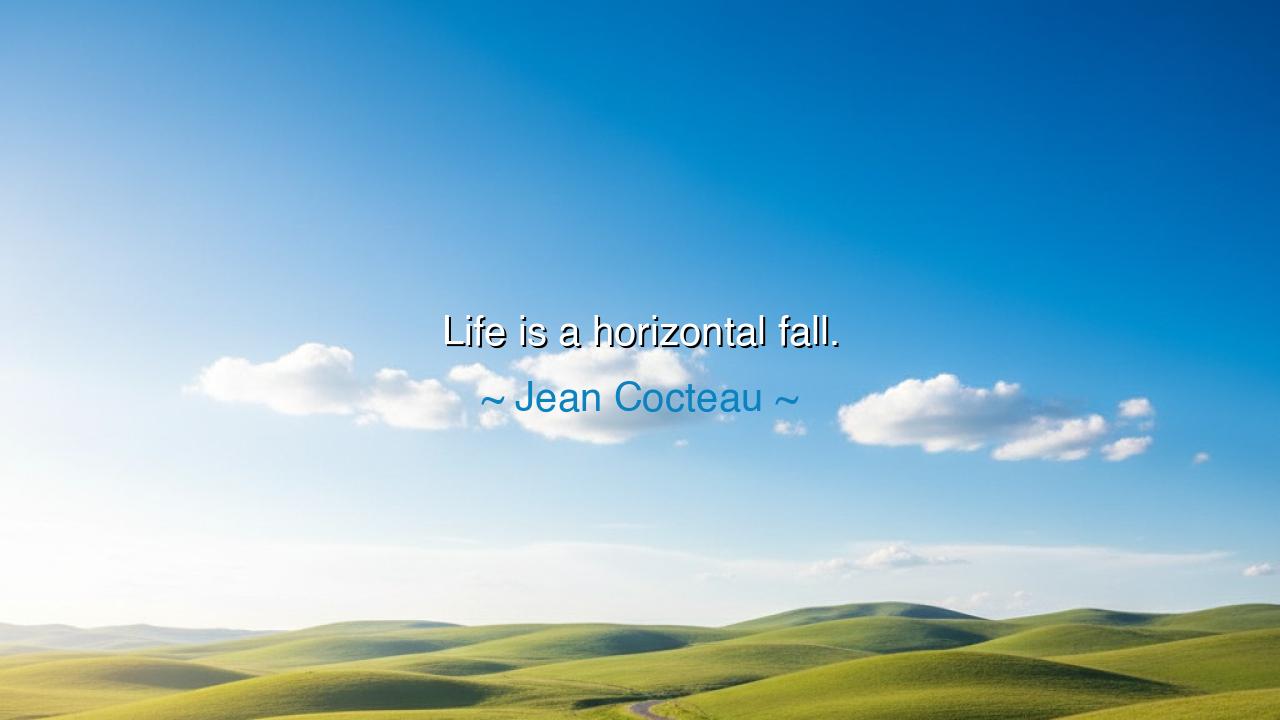
Life is a horizontal fall.






“Life is a horizontal fall.” – Jean Cocteau
In this haunting and poetic phrase, Jean Cocteau, the French artist, poet, and visionary, captures the paradox of existence—the sense that even as we move forward, we are also falling. To call life a horizontal fall is to recognize that our journey through time is a kind of graceful descent, a constant approach toward mortality. Yet Cocteau’s tone is not despairing. His words shimmer with beauty and defiance, as if to say: even in our falling, there is art; even in our decline, there is movement, purpose, and grace. The fall is inevitable—but how we fall determines the meaning of our life.
The origin of this quote lies in the heart of the twentieth century, an age torn between creation and collapse. Cocteau lived among the artists and dreamers of Paris—Picasso, Chanel, and Stravinsky—during an era when war, revolution, and art collided. He understood that to live in such a world was to be suspended between ascent and decline, hope and despair. For him, life was not a climb toward perfection, as many philosophers had imagined, but a steady, forward-moving fall—a horizontal descent through time where each step brings us closer to the end, yet also deeper into understanding.
To fall horizontally is to live with awareness of death, but without surrendering to it. Cocteau’s metaphor suggests that we are always in motion—moving toward destiny, carrying the weight of our mortality, yet never quite collapsing. Unlike a vertical fall, which ends abruptly, the horizontal fall stretches across a lifetime. It is the art of balance amid inevitability. We are like dancers on a tightrope, moving forward with poise though the ground calls us downward. In this, Cocteau’s words echo the wisdom of the ancients: to live beautifully is not to escape death, but to move through life knowing it shadows every step, and to turn that awareness into grace.
Consider the story of Leonardo da Vinci, who spent his life exploring flight—sketching wings, studying birds, dreaming of ascent. He never truly achieved flight, yet his failure was not a defeat. His horizontal fall—his lifelong striving between the possible and the impossible—gave the world inventions, paintings, and visions that lifted humanity itself. Leonardo moved forward, not upward; he lived as one who knew he would never reach perfection, but who found glory in the motion toward it. His fall was the fall of all creators: endless, forward, and filled with light.
Cocteau’s insight also speaks to the fragility of human progress. We often imagine that we are rising—building civilizations, conquering space, mastering knowledge. Yet beneath this rise lies a quiet truth: every advance carries us closer to our limits. The clock ticks, the body ages, and the world shifts beneath our feet. Still, Cocteau invites us to see beauty in this fragility. The fact that life slips from our grasp makes it more precious. The fall gives meaning to the movement, for it reminds us that every breath, every word, every act of love, is part of a fleeting miracle that will never return.
To live with this awareness is not to despair, but to awaken. The one who knows they are falling lives more consciously—cherishes more deeply, creates more urgently, forgives more easily. The horizontal fall becomes a symbol of acceptance, of living fully within impermanence. Cocteau teaches that life is not a climb toward heaven, but a walk across the earth—a pilgrimage through change, failure, and fleeting joy. And it is in embracing this impermanence that we find strength.
So, my child of the passing hour, take this wisdom into your heart: do not resist the fall. Move forward with grace, knowing that to live is to descend with dignity. Let each day be a deliberate step across the horizon of time—fearless, tender, aware. Accept that life is not a rise to glory, but a fall toward meaning. And in that fall, create beauty. For though all things descend, not all descend in vain. The art of living, as Cocteau reveals, is to make your fall a dance—to turn inevitability into poetry, and to let your motion through this fragile world leave behind a trail of light.






AAdministratorAdministrator
Welcome, honored guests. Please leave a comment, we will respond soon